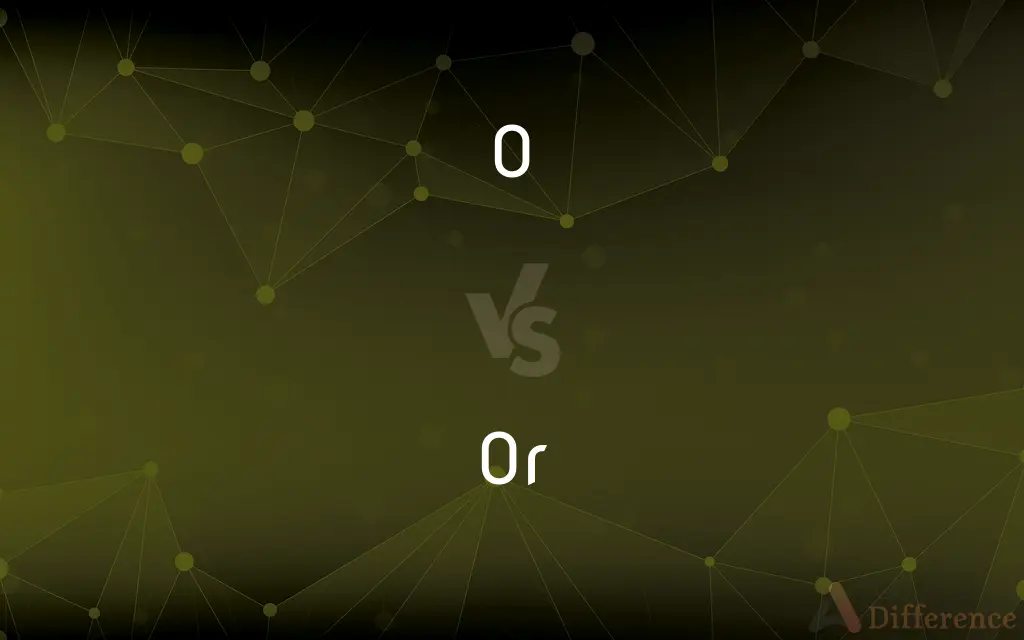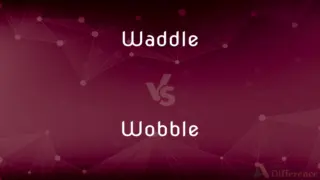O vs. Or — What's the Difference?
By Urooj Arif & Maham Liaqat — Updated on March 19, 2024
"O" is primarily used as a poetic or archaic form of address or exclamation, often seen in literature and poetry, while "or" is a conjunction used to connect alternatives or choices in sentences.

Difference Between O and Or
Table of Contents
ADVERTISEMENT
Key Differences
"O" is often encountered in poetic and literary contexts, serving as a vocative or an exclamatory particle to express emotion or direct address, as in "O Romeo, Romeo!" It carries an emotional or solemn tone, typically preceding the name of a person, place, or object being addressed or invoked. Conversely, "or" is a fundamental part of everyday language, used as a coordinating conjunction to present alternatives or choices within a sentence. It connects words, phrases, or clauses, indicating that only one of the elements connected by "or" is expected to follow or be chosen, as in "Would you prefer tea or coffee?"
While "O" emphasizes emotion and direct address, often enhancing the expressive quality of language, "or" focuses on logical structure, presenting options or alternatives without an emotional component. The distinction between them underscores the varied ways in which language can be employed: "O" to elevate and embellish, and "or" to clarify and decide.
The use of "O" is largely stylistic, chosen for its ability to evoke a certain mood or resonance, particularly in creative writing. "Or," however, is utilitarian, serving a clear grammatical function that is essential for constructing coherent and logical sentences in everyday communication.
Comparison Chart
Function
Exclamatory particle for emotional address or appeal.
Conjunction for connecting alternatives or choices.
Usage Context
Literary, poetic, formal writing.
Common in everyday language, both spoken and written.
ADVERTISEMENT
Tone
Emotional, solemn, traditional.
Neutral, logical, practical.
Placement
Typically precedes names or nouns in direct address.
Connects words, phrases, or clauses offering alternatives.
Frequency
Less common, stylistic choice.
Highly frequent, essential for coherent sentence structure.
Compare with Definitions
O
Used to express strong emotion or appeal.
O, what a beautiful morning!
Or
Used in statements of equivalence or substitution.
Two cups or one pint—either will do.
O
Invokes a sense of urgency or intensity.
O ye of little faith, why did you doubt?
Or
Presents a choice between different options.
Do you want tea or coffee?
O
Serves to elevate language or create a solemn tone.
O Death, where is thy sting?
Or
Introduces an alternative action or possibility.
Hurry up, or we'll be late!
O
Functions as a poetic device to address or appeal to someone or something.
O Wind, if Winter comes, can Spring be far behind?
Or
Specifies conditions in logical or conditional statements.
Either submit the form on time, or you will need to apply for an extension.
O
Often found in older texts or works aiming for an archaic feel.
O Time, thou must untangle this, not I.
Or
Offers a solution or workaround in a problem statement.
Use a hammer, or if that's not available, a heavy book might work.
O
O, or o, is the fifteenth letter in the ISO basic Latin alphabet and the fourth vowel letter in the modern English alphabet. Its name in English is o (pronounced ), plural oes.
Or
Used to indicate an alternative, usually only before the last term of a series
Hot or cold.
This, that, or the other.
O
Used before the name of or a pronoun referring to a person or thing being formally addressed
"How can I put it to you, O you who prepare to travel with important matters on your mind?" (Jo Durden-Smith).
Or
Used to indicate the second of two alternatives, the first being preceded by either or whether
Your answer is either ingenious or wrong. I didn't know whether to laugh or cry.
O
Used to express surprise or strong emotion
"O how I laugh when I think of my vague indefinite riches" (Henry David Thoreau).
Or
(Archaic) Used to indicate the first of two alternatives, with the force of either or whether.
O
The 15th letter of the modern English alphabet.
Or
Used to indicate a synonymous or equivalent expression
Acrophobia, or fear of great heights.
O
Any of the speech sounds represented by the letter o.
Or
Used to indicate uncertainty or indefiniteness
Two or three.
O
The 15th in a series.
Or
Before. Followed by ever or ere
"I doubt he will be dead or ere I come" (Shakespeare).
O
Something shaped like the letter O.
Or
A logical operator that returns a true value if one or both operands are true.
O
A zero.
Or
Gold, represented in heraldic engraving by a white field sprinkled with small dots.
O
Of
Lots o' luck.
Top o' the morning.
Or
Before.
O
Alternative form of oh
Or
(logic) An operator denoting the disjunction of two propositions or truth values. There are two forms, the inclusive or and the exclusive or.
O
Operator
Or
Otherwise a consequence of the condition that the previous is false.
It's raining! Come inside or you'll catch a cold!
O
(acronym of) Object, see SVO
Or
(tincture) The gold or yellow tincture on a coat of arms.
O
A zero used in reading out numbers.
It is currently two-o-five in the afternoon (2:05 PM).
The first permanent English settlement in America was in Jamestown in sixteen-o-seven (1607).
Or
(tincture) Of gold or yellow tincture on a coat of arms.
O
Over
Or
(obsolete) Early (on).
O
O, the fifteenth letter of the English alphabet, derives its form, value, and name from the Greek O, through the Latin. The letter came into the Greek from the PhŒnician, which possibly derived it ultimately from the Egyptian. Etymologically, the letter o is most closely related to a, e, and u; as in E. bone, AS. bān; E. stone, AS. stān; E. broke, AS. brecan to break; E. bore, AS. beran to bear; E. dove, AS. dūfe; E. toft, tuft; tone, tune; number, F. nombre.
Or
(obsolete) Earlier, previously.
O
Among the ancients, O was a mark of triple time, from the notion that the ternary, or number 3, is the most perfect of numbers, and properly expressed by a circle, the most perfect figure.
Or
Before; ere. Followed by "ever" or "ere".
O
The letter O, or its sound.
Or
A particle that marks an alternative; as, you may read or may write, - that is, you may do one of the things at your pleasure, but not both. It corresponds to either. You may ride either to London or to Windsor. It often connects a series of words or propositions, presenting a choice of either; as, he may study law, or medicine, or divinity, or he may enter into trade.
If man's convenience, health,Or safety interfere, his rights and claimsAre paramount.
Maugre thine heed, thou must for indigenceOr steal, or beg, or borrow thy dispence.
O
Something shaped like the letter O; a circle or oval.
Or
Ere; before; sooner than.
But natheless, while I have time and space,Or that I forther in this tale pace.
O
A cipher; zero.
Thou art an O without a figure.
Or
Yellow or gold color, - represented in drawing or engraving by small dots.
O
One.
Or
A state in northwestern United States on the Pacific
O
An exclamation used in calling or directly addressing a person or personified object; also, as an emotional or impassioned exclamation expressing pain, grief, surprise, desire, fear, etc.
For ever, O Lord, thy word is settled in heaven.
O how love I thy law ! it is my meditation all the day.
O for a kindling touch from that pure flame!
But she is in her grave, - and ohThe difference to me!
Oh for a lodge in some vast wilderness!
We should distinguish between the sign of the vocative and the emotional interjection, writing O for the former, and oh for the latter.
Or
A room in a hospital equipped for the performance of surgical operations;
Great care is taken to keep the operating rooms aseptic
O
A nonmetallic bivalent element that is normally a colorless odorless tasteless nonflammable diatomic gas; constitutes 21 percent of the atmosphere by volume; the most abundant element in the earth's crust
O
The 15th letter of the Roman alphabet
Common Curiosities
Is "or" always used to present only two options?
While "or" often presents two options, it can be used to connect multiple alternatives in a list.
Can "O" be used in formal letters?
"O" is generally reserved for poetic or highly emotional contexts and is not commonly used in modern formal letters.
Is "O" still used in contemporary writing?
While less common in everyday language, "O" is still used in contemporary poetry and literary works to evoke emotion or a traditional tone.
Are there instances where "or" doesn't present an alternative?
"Or" can sometimes be used in the sense of "before" or to clarify a preceding statement, rather than strictly presenting an alternative.
Can "O" be replaced with "Oh" in poetry?
"O" and "Oh" can be used interchangeably in poetry, but "O" is more archaic and formal, while "Oh" is more common in expressing actual emotion or surprise.
Does "or" imply that both options cannot occur together?
Typically, "or" suggests that only one of the connected options is expected to follow, but in some contexts, it can be inclusive, allowing for both possibilities.
How is "O" perceived in spoken language?
In spoken language, "O" might appear antiquated or overly formal, except in recitations of poetry or dramatic readings.
Is there a modern equivalent to "O"?
"Oh" serves as a more modern and versatile expression of emotion, surprise, or appeal, applicable in various contexts.
Can "or" be used to imply a consequence?
Yes, "or" can introduce a consequence or condition, as in "Finish your homework, or you won't be allowed to go out."
Can "or" be used at the beginning of a sentence?
While less common, "or" can start a sentence when it introduces an alternative or correction to a previous statement.
Share Your Discovery

Previous Comparison
Treated vs. Tret
Next Comparison
Waddle vs. WobbleAuthor Spotlight
Written by
Urooj ArifUrooj is a skilled content writer at Ask Difference, known for her exceptional ability to simplify complex topics into engaging and informative content. With a passion for research and a flair for clear, concise writing, she consistently delivers articles that resonate with our diverse audience.
Co-written by
Maham Liaqat















































